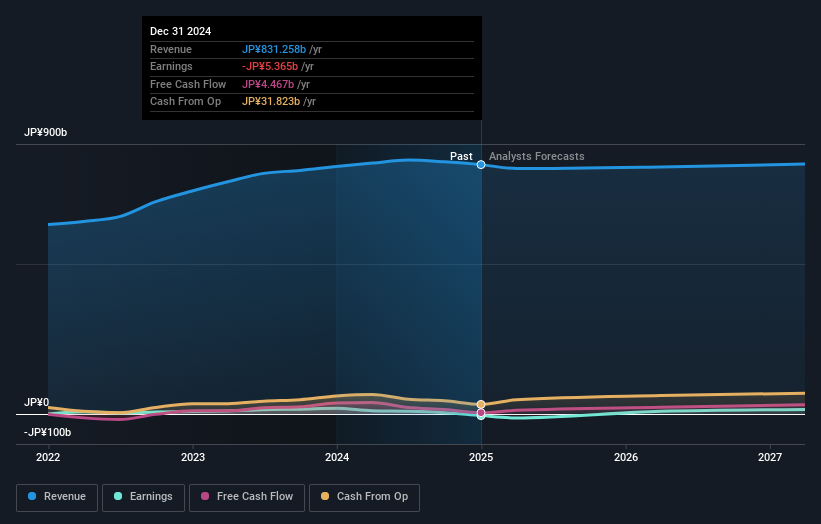individual investors who own 58% along with institutions invested in NTN Corporation (TSE:6472) saw increase in their holdings value last week

Key Insights
- NTN's significant individual investors ownership suggests that the key decisions are influenced by shareholders from the larger public
- A total of 25 investors have a majority stake in the company with 42% ownership
- Institutional ownership in NTN is 36%
To get a sense of who is truly in control of NTN Corporation (TSE:6472), it is important to understand the ownership structure of the business. We can see that individual investors own the lion's share in the company with 58% ownership. That is, the group stands to benefit the most if the stock rises (or lose the most if there is a downturn).
While individual investors were the group that benefitted the most from last week’s JP¥7.6b market cap gain, institutions too had a 36% share in those profits.
In the chart below, we zoom in on the different ownership groups of NTN.
View our latest analysis for NTN

What Does The Institutional Ownership Tell Us About NTN?
Many institutions measure their performance against an index that approximates the local market. So they usually pay more attention to companies that are included in major indices.
We can see that NTN does have institutional investors; and they hold a good portion of the company's stock. This implies the analysts working for those institutions have looked at the stock and they like it. But just like anyone else, they could be wrong. It is not uncommon to see a big share price drop if two large institutional investors try to sell out of a stock at the same time. So it is worth checking the past earnings trajectory of NTN, (below). Of course, keep in mind that there are other factors to consider, too.

Hedge funds don't have many shares in NTN. Nomura Asset Management Co., Ltd. is currently the company's largest shareholder with 4.7% of shares outstanding. In comparison, the second and third largest shareholders hold about 3.7% and 3.6% of the stock.
Our studies suggest that the top 25 shareholders collectively control less than half of the company's shares, meaning that the company's shares are widely disseminated and there is no dominant shareholder.
While studying institutional ownership for a company can add value to your research, it is also a good practice to research analyst recommendations to get a deeper understand of a stock's expected performance. Quite a few analysts cover the stock, so you could look into forecast growth quite easily.
Insider Ownership Of NTN
While the precise definition of an insider can be subjective, almost everyone considers board members to be insiders. Management ultimately answers to the board. However, it is not uncommon for managers to be executive board members, especially if they are a founder or the CEO.
I generally consider insider ownership to be a good thing. However, on some occasions it makes it more difficult for other shareholders to hold the board accountable for decisions.
Our most recent data indicates that insiders own less than 1% of NTN Corporation. It has a market capitalization of just JP¥111b, and the board has only JP¥119m worth of shares in their own names. Many investors in smaller companies prefer to see the board more heavily invested. You can click here to see if those insiders have been buying or selling.
General Public Ownership
The general public -- including retail investors -- own 58% of NTN. With this amount of ownership, retail investors can collectively play a role in decisions that affect shareholder returns, such as dividend policies and the appointment of directors. They can also exercise the power to vote on acquisitions or mergers that may not improve profitability.
Next Steps:
It's always worth thinking about the different groups who own shares in a company. But to understand NTN better, we need to consider many other factors. To that end, you should be aware of the 2 warning signs we've spotted with NTN .
If you are like me, you may want to think about whether this company will grow or shrink. Luckily, you can check this free report showing analyst forecasts for its future.
NB: Figures in this article are calculated using data from the last twelve months, which refer to the 12-month period ending on the last date of the month the financial statement is dated. This may not be consistent with full year annual report figures.
Valuation is complex, but we're here to simplify it.
Discover if NTN might be undervalued or overvalued with our detailed analysis, featuring fair value estimates, potential risks, dividends, insider trades, and its financial condition.
Access Free AnalysisHave feedback on this article? Concerned about the content? Get in touch with us directly. Alternatively, email editorial-team (at) simplywallst.com.
This article by Simply Wall St is general in nature. We provide commentary based on historical data and analyst forecasts only using an unbiased methodology and our articles are not intended to be financial advice. It does not constitute a recommendation to buy or sell any stock, and does not take account of your objectives, or your financial situation. We aim to bring you long-term focused analysis driven by fundamental data. Note that our analysis may not factor in the latest price-sensitive company announcements or qualitative material. Simply Wall St has no position in any stocks mentioned.
About TSE:6472
NTN
Engages in the manufacture and sale of bearings, drive shafts, and precision equipment and other products in Japan and internationally.
Undervalued with adequate balance sheet.
Similar Companies
Market Insights
Community Narratives



